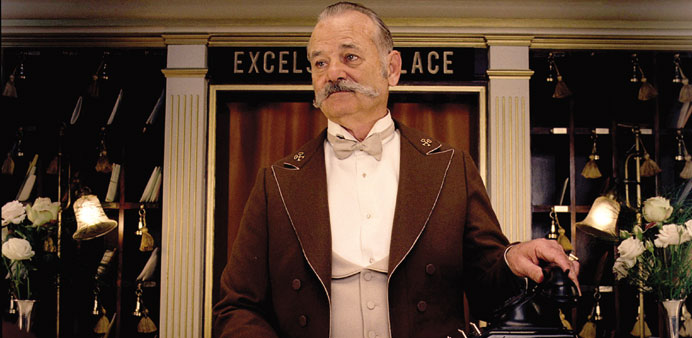WEB OF STORIES: Bill Murray stars in The Grand Budapest Hotel.
Screwball intrigue fills the Grand new European jaunt from Wes Anderson. By Mark Olsen
More than just about any other major American filmmaker working today, writer-director Wes Anderson doesn’t so much make movies as create worlds. Each of his films takes place in its own strange sovereignty, whether the Texas prep school of Rushmore, the train running through India in The Darjeeling Limited or the island hideaway for a pair of adolescent lovers in Moonrise Kingdom.
His latest, The Grand Budapest Hotel, is set in the fictional country of Zubrowka. Though the story skips through multiple time periods, the main action is set in the 1930s against the backdrop of impending war, as a meticulous yet rambunctious concierge known as Monsieur Gustav H (Ralph Fiennes) takes on a young refugee named Zero Moustafa (Tony Revolori) as lobby boy and protege.
The cast also features F Murray Abraham as an older Moustafa, Tom Wilkinson and Jude Law as an author at different ages and an impressive ensemble including Bill Murray, Tilda Swinton, Owen Wilson, Saoirse Ronan, Edward Norton, Jason Schwartzman, Mathieu Amalric and Lea Seydoux.
Along the way there is a contested inheritance, a missing painting, a brief imprisonment, a few separate chases, a secret society and the impending menace of an invading army, giving the film an air at times of a farcical caper. Fiennes in particular conjures a surprising spirit of screwball grace.
The film, which opened in Los Angeles, has a rather complicated framing structure that creates a story within a story within a story within a story. (Anderson, a two-time Oscar nominee for screenwriting, shares story credit with his friend, the artist Hugo Guinness.) The film is, among other concerns, about mentorship, the end of eras and how the traumas of youth can be carried forward through adulthood. Also, pastries.
Themes of mortality, the fragility of romance and the importance of approaching life with a sense of adventure have also pulsed through Anderson’s previous films — frequently seen through the prism of naive and then pained youth. The films are swathed in his bedrock style of deadpan comedy and aching melancholy within meticulously constructed visuals. Anderson and his longtime cinematographer, Robert Yeoman, shot Budapest on 35mm film and switched aspect ratios to signal changes in time periods. For Anderson, each film is “starting from scratch,” meant as a renewed exploration both for him as a filmmaker and audiences too.
“To me each one is just a completely new ball of wax, if I’m using that expression properly. I’m not really using that expression properly. But anyway, you get the idea,” said Anderson recently by phone from his home in New York.
“I just don’t know what doesn’t keep them distinctive,” he added. “I know often people see my movies linked to each other, which I totally understand why they see that, but for me I’m just doing a completely different story. I make no effort to make them anything like each other. I just do ‘em the way I like to do ‘em.”
The film, shot in Germany, recently premiered as the opening-night film of the Berlin International Film Festival. Variety declared it “Anderson’s most ambitious and deeply felt movie to date.” The Village Voice derided it as little more than “a meticulously appointed dollhouse.” Anderson, 44, has become an unlikely lightning rod and a polarising figure, both revered and derided (and sometimes a bit of both at once).
“I don’t want to try to guess why people don’t respond to his work, but some people don’t. One theory might be that his works can be very confusing to people who expect movies to be one way,” said Matt Zoller Seitz, author of the recently published The Wes Anderson Collection, a career survey including interviews with the filmmaker covering all his previous work. — Los Angeles Times, MCT
Woodley doesn’t own a cell phone
Actress Shailene Woodley isn’t a tech-savvy person and she says that she does not even have a cell phone. “I’m not a big technology person. I don’t even have a smartphone. I don’t even have a cell phone,” the 23-year-old actress said in a statement. Woodley prefers a lifestyle without constant intrusion by technology. “There’s a bigger lack of privacy than there’s ever been, but there’s also a bigger lack of camaraderie and community than there’s ever been. “Since I got rid of my phone, I’m talking to people more than I’ve ever talked to in my life because I no longer have that crutch. The more you get away from the entire technological buzz, the more freedom you have,” she added. Despite her nature, she has featured in Divergent, a movie which is based in a futuristic era where the use of gizmos and high-tech gadgets is unavoidable. — IANS
Will Smith to adapt Harlem Hellfighters

